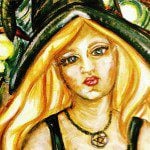
One thing about narrative is of course the way things braid together, and they look unrelated to start, until suddenly they aren’t.
I could tell the long and involved story of the several things that came together to get me to finally get my act together and do some pisanki – an impulse I have had every spring for a long time, as spring is apparently the time that I think of my Polish ancestors – but that’s a whole other tale, a story nested inside my story.
Suffice to say that I finally got up off my butt and started sinking into these symbols, and I listened to the whispers of my ancestors, who told me that I had responsibilities, to them, to the traditions. That the traditions had been broken, but I was listening, and they would guide me to fixing them. That the pain of my line – and I do not know if it is the pain I know about, the rending of immigration and the Procrustean bed that it made, or if it is older pain, or both – had cut me off from the strength I could have learned, and that they would put it right. That I had responsibilities, and they had responsibilities to me, and I would learn what they could give me of what I had never had, the things that my mother could not teach me, because her mother could not teach them to her, because, because, because.
And
The other day, a friend posted an image to Facebook. Seated on little meditation cushions are a cupcake, leading a class of a cookie, a muffin, and a doughnut. The cupcake says, “Find your center.” The cookie and muffin have their eyes closed, smiling; the doughnut’s expression is tragic.
The friend commented that this is how some forms of meditation can feel to people with experience of trauma.

Now, obviously, I pluck that thought out and set it up next to the other one in order to illustrate a point. But it’s also the case that the doughnut probably would not have hit me quite so hard if I did not have that sense of my foremothers whispering to me about the hole in my spirit, the things that I lacked, the things that I needed to do to heal that wound.
An ex-boyfriend and I would joke about those moments of synchronisity. “The scriptwriters are playing again.” We, both writers, took the narrative that we created, that we found in our lives, and made this other narrative, about the imagined people writing our story. He reads my writing, my stories, and we talk. I made a comment once about my fiction exploring the experience of the outsider in various ways, when I was putting together a biography for a submission somewhere, and he commented that I was very consistent that way. I said, “Write what you know!” and he was still laughing several minutes later.
The shrine on the table next to my bed is of a god known for, among many other things, other stories, other truths, his governance over the foreign, deviant, and perverse. “Write what you know” is not a purely secular sentiment.
Braid, and braid, and braid: the ancestors tell a story of emptiness and longing and disempowerment, the cartoon talks about trauma and hollowness, the god of the stranger lurks by the bed because He is one of the Powers of the world I know best.
And then I do it for fun. And realise after I get started that I’m working the same threads. The Powers and the needs of the spirit are everywhere.

Among my hobbies is roleplaying gaming, which is of course telling of stories in a particular format.
And so I made a character. I put together her background in a way that was consistent with the tropes I wanted to play with, which had nothing to do with ancestors, which had nothing to do with trauma, which had nothing to do with hollowness; it was all about playing with the idea of someone in the Star Wars universe who could get to adulthood without being spotted as a potential Jedi, and who wasn’t some sort of chosen one or destined hero or particularly important in the grand scheme of things.
But now I have her living with me, this creation – this magical construct I have built out of numbers and dice, research about the universe in which she lives and my own notions of story – and I find this:
That she was raised rootless, unconnected with her sense of her people. That she learned of her people’s culture second-hand, from a woman who had not breathed the air of her native planet since she was a teenager. That she learned about who she was from research, not from growing up knowing, and found herself constantly torn between wishing to feel that these traditions felt like they could be hers by right, wondering if that would make her feel whole, and being enraged by the violence that was embedded in them, the scars of history. I have a woman who collects religious artifacts looking for meaning, without a clear sense of belonging, who looks to the space between the stars and every time she takes her ship out there she half-hopes that she might encounter her people’s goddess, and half-believes that when she does not it is because she is too broken to see. Or to be seen.
I find that she, like me, is hollow and looking to find a way to be whole.
And I find that she looks at the possibility that she might have power – have Power, have the ability to Use The Force – and she is enraged by it. By the fact that she feels that this magic detracts from her accomplishments, because she sees power as something external to herself, something which has, by her radical vulnerability to it, dragged her out of her comfortable life. (And it is a radical vulnerability: to be sensitive to the pantheistic Force well enough to cause it to act is also to be sensitive to that power’s needs for someone to act for it. And I suspect right about here some people whose training resembles my own will suddenly nod and say, “…right. That.”)
She says she has reinvented herself twice, and what is the price for reinventing herself a third time, as someone who has this power? What will she have to give up to claim it? She has no idea, but she’s a merchant, a trader; she knows that everything has a price, especially the things that shouldn’t.
She is not afraid of her power; her hollowness is not that sort. She is reckless in her lack of fear. She does not trust this power, but she has depended on it all her life, and she is angry with it for revealing that dependency to her now, as if it means she did not achieve her own successes, as if they were done for her. And I know, as she does not, that there is no going home for our sort of homelessness, there is only claiming the whole of who one is in order to make a home, somehow, from what we have.
So I find myself exploring her story – with the support of friends, telling stories, that strange community rite that is not religious and yet – and the story of her is also, in its way, a story of me, and one that I did not realise I was going to want to be exploring when I made her up. Stories don’t have clean boundaries like that; if a story’s worth telling, it blends over, and it starts partaking of all these other things as well. I didn’t mean to be exploring One Of My Current Spiritual Puzzles when I went down to the basement and pick up the dice – I built her before the whispering, for one – but that doesn’t mean that the ancestors’ voices are not there when the dice hit the table and suddenly she and I are in the same place, wondering what “Find your center” means, choosing whether or not to claim our inborn strength.
I hope she figures it out. I hope I do, too. Maybe we can help each other.

Patheos Pagan on Facebook.

the Agora on Facebook
Hills of the Horizon is published monthly on the 29th here on the Agora. You can subscribe by RSS or via e-mail.
Please use the links to the right to keep on top of activities here on the Agora as well as across the entire Patheos Pagan channel.













